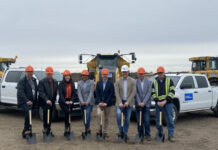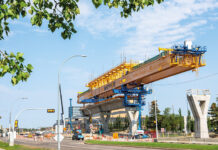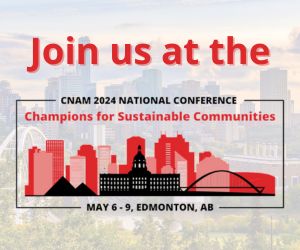Carole Saab, the chief executive officer of the Federation of Canadian Municipalities (FCM) brings a clear and ambitious vision for Canadian municipalities on the national and international stage. Recognized as one of the country’s leading lobbyists, Saab has forged new paths for local government through innovative programming.
ReNew Canada recently engaged Saab to share her experience on her relatively new role, during this especially challenging time, to provide readers with her perspectives and insight into the organization’s goals for addressing challenges of the ongoing coronavirus pandemic and for supporting public infrastructure in 2021 and beyond.

Carole Saab, chief executive officer of FCM.
Last year you became FCM’s CEO. How do you think your decade-long experience with FCM, and other experiences, have prepared you to be the best person to take on this challenge?
In my time with FCM I have learned more about our cities and communities—what makes them tick, their frontline challenges, and the opportunity and innovation they can drive—than I would have in a lifetime otherwise. I’ve also been immersed in the complexities of our country, the unique and disparate realities that come together to form our fabric, and that need to be duly considered in all issues we face. Fundamentally, it’s that knowledge of our members and our national landscape that I most call on and continue to develop, that positions me to take on the challenge of being CEO—and it’s why I insist we are foremost member-focused in our work. Having led at an executive level our policy, government relations and communications teams has also given me the opportunity to build relationships and a deep understanding of the federal landscape, but it’s learning from our members that continues to give me, and us as an organization, our edge.
You have played a critical role in negotiating and securing historic investments in national infrastructure, municipal programming, and capacity building. How have you helped FCM to pivot in the face of the ongoing pandemic?
When the pandemic started, we were determined to do what we are best at: helping and empowering our members as they lead the way to serve Canadians in their communities. And given the scale and urgency of the crisis, that meant revisiting our plans and completely retooling to focus our resourcing very deliberately on pandemic response. Since day one, local leaders have been working flat-out to keep Canadians safe. In the face of rising costs and plummeting revenues, they have kept vital municipal services going strong—from frontline workers to public transit to shelters for vulnerable residents. Our job is to ensure they are connected, informed, and resourced. That means both bringing them together strategically to enable shared best thinking, developing tools they can leverage locally, and being a critical link to the federal government to ensure a coordinated response that reflects local realities. Key to that, is the work FCM led to secure critical emergency support for operating costs in a historic agreement that recognized the absolute urgency of continuing our frontline work: the Safe Restart Agreement. As this pandemic continues, millions of Canadians are depending on municipalities to keep essential services running. And many municipalities are still taking extraordinary measures for residents. But to keep vital services going strong this year, we need to continue the conversation with other orders of government for ongoing support. That is why FCM continues to advocate daily for solutions and engage with most senior federal decision makers.
The FCM is known to be the national voice for communities across the country, whether large or small, rural or urban and northern. How are you helping to address municipal challenges in more remote communities?
The pandemic resulted in unique and serious challenges for rural Canada, ones that we sought to understand and engage immediately. Everything from the lack of access to broadband for health services, online businesses, and education to the potential impacts on the agriculture chain and tourism industry. As with most national challenges, the rural dimension needed to be uniquely considered, and we took quite seriously our role in ensuring that was the case.
Rural and remote communities drive a third of Canada’s economy, and the whole country needs them to thrive. In the fall, FCM released recovery recommendations including steps like strengthening rural and regional passenger bus service, expanding the rural and remote stream of the Reaching Home homelessness initiative, and streamlining federal funding to work for rural communities. For example, reducing high minimum project thresholds in federal climate resilience funding. And of course, swiftly following through on investments to achieve universal Internet access. FCM is their voice at the federal level and we will continue to advance these critical priorities, not just for the benefit of rural and remote communities, but for the benefit of the entire country.
What are some key public infrastructure projects the FCM is supporting to follow up on its “Build back better together” recommendations?
Building a green and inclusive recovery will be essential to our country’s future. Across the country, local governments are on the frontlines as floods, wildfires and new climate extremes threaten families and businesses, costing our economies billions each year—and we also are on the forefront of delivering solutions to keep people safe and to reduce greenhouse gas (GHG) emissions. And local governments see firsthand the negative and pervasive impacts of social and economic exclusion.
Canada’s recovery is an opportunity to scale up local solutions for nation-building progress. A green and inclusive recovery starts with expanding the public transit systems that are so integral to the transportation modal shift we will need to reach net zero. We welcome the federal government’s announcement of an accelerated Permanent Transit Fund and we hope to see further money committed to enable municipalities to transition their transit fleets to Zero and Low Emission Vehicles. For additional deep GHG reductions, FCM’s proven Green Municipal Fund can deploy recovery funds directly to the municipal frontlines—to continue to drive ambitious building retrofits, vehicle-fleet upgrades, and natural climate solutions.
Building more inclusive communities starts with ensuring that every Canadian has an affordable roof over their head. And that’s why we’ve put forward a series of recommendations to ensure that ending homelessness and investing in affordable housing is a cornerstone of the economic recovery.
Community, cultural, and recreational infrastructure also promotes social and economic inclusion. By increasing access to services, these facilities help to reduce social and geographic disparities. From seniors’ and recreation centres to parks and libraries, these are venues for face-to-face interaction and support. Right across the country, this is the glue that holds communities together.
What are your goals for the future of the FCM and do you have any specific plans to increase the organization’s level of engagement and influence?
In the near-term, FCM’s focus will continue to be on tooling municipalities across the country to keep our citizens safe, protect frontline municipal services and prepare for the post-pandemic future. And, to work to ensure Canada’s recovery is rooted in our cities and communities. Building a stronger Canada together starts now, with local leaders in communities of all sizes. Municipalities are focused on tackling urgent pandemic challenges, and we can and should do this in ways that deliberately build toward a green and an inclusive national recovery. To that end, FCM has also shared proposals to the federal government to create jobs, promote equality and tackle climate change—in the places where Canadians live, work, and raise families.
The COVID-19 pandemic has also shone a harsh light on many of our vulnerabilities as a country, and if we choose to learn from this moment, it stands to be transformational. This includes the reality that municipalities do not have fiscal tools that match their modern role in supporting Canadians and our economy. When pandemic impacts forced many cities and communities to the brink of cutting services—or insolvency—it is undeniable that as a country, there is a problem we need to fix. Yes, we need an urgent and immediate intervention, and in the longer-term, we need a more tenable and lasting solution. As an organization we will be focused on advancing this conversation.
We also are going to continue to deepen our engagement and support of our membership, including over time, expanding on our capacity building tools and programs. Most national challenges and opportunities we face require activating and optimizing levers held by all orders of government. And while we won’t take our foot off the pedal on our advocacy and representation to our federal partners, my goal is to move FCM deeper into the space of supporting our members in mobilizing, optimizing, and developing their capacity at a local level. Coordinated action between all three orders of government is how we’ll break the dam on many critical issues, and we’re going to drive boldly in that direction.
Any concluding thoughts for ReNew Canada readers?
Canadians across the country want to emerge from this pandemic with a country that’s more resilient to the next threat—be it a virus or extreme weather—and with leaders who tackle milestone challenges proactively. This includes a generational opportunity for bold action on climate change, and municipalities are ready to work with federal and provincial governments to answer that call.
This is inextricably linked to the opportunity to build a more inclusive and equitable country. FCM is the national voice of the governments working closest to people’s everyday hopes and challenges, united by a commitment—as we often express it—to build better lives for Canadians. And fundamentally, we hold that every one of those lives should be lived free from racism and systemic oppression. As an organization, and through our Board, we have made important commitments to advance this work, and it will be a critical part of our path going forward.
Connie Vitello is the interim editor of ReNew Canada.
















